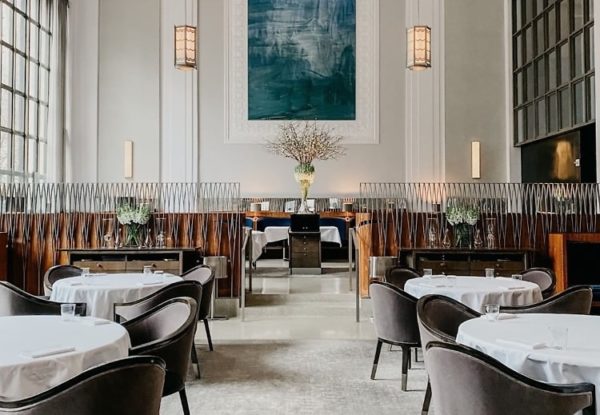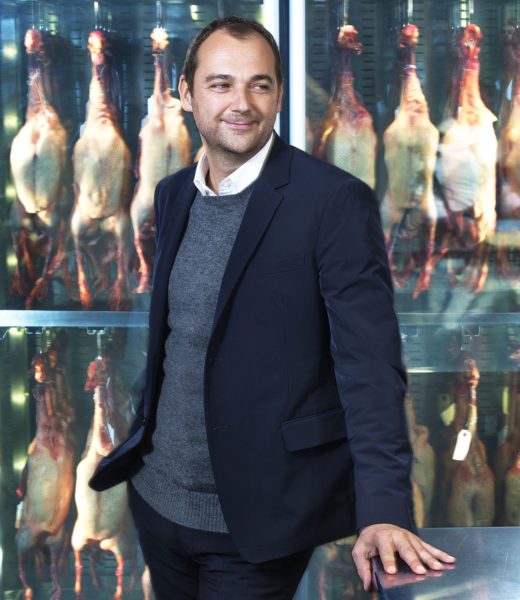In a photo he posted this week, Daniel Humm, the celebrated chef of Eleven Madison Park in New York City, looks joyfully into the camera. He squats in the middle of a barren greenhouse garden, conspicuously devoid of any vegetables, draped in a velvety cream-colored coat and flashing jazz hands lightly dusted in soil. A quick search reveals the chef’s jacket is Prada and worth almost three thousand dollars. His matching Prada shoes look fresh out of the box, lily-white like a freshly-pressed linen tablecloth. If these shoes have ever encountered top soil before, they certainly show no signs of it.
Although Humm’s expression is meant to convey the euphoria of being liberated from the tyranny of meat-based cooking, it’s easy to interpret his expression as a taunt directed at certain viewers, like me, who will spend eternity stuck behind the EMP paywall. Looking at the photo, I try not to be too cynical. Despite removing meat and meat products from his recipes, the price of a meal at Eleven Madison Park will remain at $335 per person—continuing the restaurant’s reign at or near the top of the list of most expensive meals in New York City. This does little to quell my cynicism. Most people could subscribe to an entire season of farm-fresh vegetables from their local CSA for the price of one plant-based meal in Chef Humm’s secret garden.
To no surprise, the food media almost immediately began doing cartwheels, praising Humm’s courage and vision. The enthusiasm seemed peculiar given the lack of fanfare when other chefs made similar announcements, like Dominique Crenn whose Michelin-starred restaurant Atelier Crenn went meatless two years earlier in 2019. (It continued to serve fish.) Vegan food has always been stigmatized, but upscale Vegan has been a non-starter. Despite the surging popularity of plant-based cuisine, of the 135 three-starred Michelin restaurants in the world, none are vegan.
The dearth of high-end Vegan restaurants makes it impossible to ignore the significance of Humm’s announcement. Rachel Sugar penned a sympathetic essay for Grub Street in which she praised the intrinsic value of Humm rejecting meat in a more pragmatic sense. She acknowledges that—as a white, male, fine-dining chef—he’s an easy target. “Anything that undermines the dominance of meat is good for the advancement of plant-based eating,” writes Sugar. Humm’s choice to present a menu of vegetables without discounting the price also makes a big statement.
What matters is the positioning of the new menu as equal to the old, meat-filled version: There is nothing lesser about vegetables, which at Eleven Madison Park will be every bit as rarified, as exclusive, as grotesquely inaccessible, as meat.
Rachel Sugar, Grub Street, May 5, 2021
In her article, Sugar wants to convince us that the benefits of Humm’s decision to go meatless will likely be felt further downstream. To focus solely on optics misses the broader impact of what his announcement could mean for Veganism in general.
Korsha Wilson, a food writer and host of the A Hungry Society podcast, was less impressed by what she saw as virtue signaling. In a series of tweets, she pointed out that although Humm’s cooking will change, his affluent audience will not. Using phrases like “community, higher purpose and redefining luxury” amounts to “a repackaging of fine dining to fit the more “conscious” tastes of wealthy consumers after a year of social upheaval.”
Humm’s heart appears to be in the right place. But it doesn’t help his case that barrier to entry for dining at EMP is still so high. Had he introduced the plant-based menu with tiered pricing for prix fixe or a la carte dishes to make dining at EMP more accessible, the backlash might’ve been less vicious. A portion of the proceeds from EMP’s sales will fund charity work through his partnership with Rethink Food an NYC-based organization dedicated to ending hunger. Every meal purchased at EMP will fund five meals to feed the needy. During the pandemic, Humm and his staff have also prepared over a million meals for food insecure New Yorkers from inside the Met Life Building where EMP’s kitchen has been closed for over a year.
At the end of the day, the problem is that Daniel Humm is selling an agrarian fantasy to guests who can afford to make a pilgrimage to his Vegan Field of Dreams. If he builds it, they will come. This is what’s fundamentally wrong with fine dining in the first place. It’s founded on the exploitation of limited resources and cheap labor to provide wealthy people with so much abundance that they can justify spending more money on a single meal than one should ever cost. The puppetry of fine dining is predicated on this culinary sleight-of-hand. Why do you think captains at EMP used to perform table-side card tricks?
Humm wrote on Instagram that his decision was motivated by the fact that “the current food system is unsustainable.” But what’s sustainable about his guests spending as much money on an evening’s meal at Eleven Madison Park as most people do on their monthly rent? Or enough to feed an entire family for a week? Humm is not running a non-profit organization, and it seems disingenuous to behave as though he is.
In the near term, Humm’s decision may be a shot of adrenaline for the plant-based movement, but commoditizing Vegan food as haute cuisine and recasting Veganism as luxurious seems to violate many of its foundational principles. If Humm is successful, more chefs may follow his lead, but this will likely only lend prestige, not legitimacy.
Praising Humm for his contributions to plant-based cooking is like praising Elon Musk for his contributions to renewable energy. Musk presents himself as innovator offering technological solutions to climate change, yet Tesla has invested billions in Bitcoin, which may turn out to be more destructive to the environment than the internal combustion engine. There is a cost to propping up false prophets like Musk. We end up overlooking the real heroes.
Shining a spotlight on Humm’s plant-based cooking shouldn’t come at the expense of others doing important work, especially in underprivileged communities. New York City has hundreds of Vegan restaurants and food non-profits like Urban Vegan Kitchen and Chilis on Wheels where BIPOC chefs and activists have been helping to make Vegan food more accessible for years. P.S. Kitchen, an immigrant-owned Vegan restaurant in Manhattan’s theater district, operates as a non-profit business that uses its proceeds to create jobs for incarcerated people and support criminal justice reform.
Other New York City restaurant groups, like the one owned by veteran restaurateur Ravi DeRossi, are going all-in on promoting a plant-based lifestyle. DeRossi’s company, Overthrow Hospitality, has recently opened three new Vegan concepts in NYC, all of which are helmed by chefs of color. The company also sponsors Vegan community fridges and mutual aid programs, including giving away free Vegan meals to anyone in need at Avant Garden. Media coverage of DeRossi’s decision to go plant-based company-wide paled in comparison to Humm’s.
Recognition helps, but it can only take these businesses so far. Vegan chefs need resources and investment, something that has proven elusive for chefs of color, immigrants, and LGBTQ entrepreneurs. If Humm manages to be successful with his revamp of EMP, this may bode well for the commercial prospects of Vegan fine dining, but it may also convince investors that Vegan concepts can only work with another high-profile, white, male chef at the helm.
To effect meaningful change, Humm should use his platform to help introduce the world to the denizens of unheralded chefs and activists who are advancing the cause of plant-based cooking on a community level everyday. He can use his influence to help direct resources into communities that have no access to his restaurant. But cooking behind a walled garden, one that welcomes some and excludes others, limits the impact of his decision to go Vegan. Making the garden more accessible to everyone would not only contribute to improving public health but would also bring awareness to the need to repair our broken food system. Now that would be something to celebrate.



